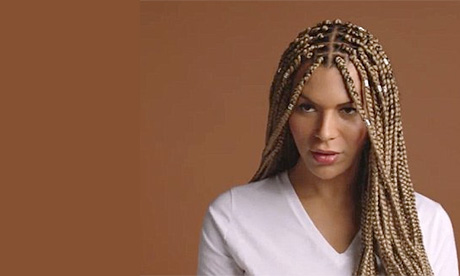Munroe Bergdorf probably hates you.
Certainly if you are white she will think you are pretty disgusting.
She thinks that you, like ‘all white people’, partake in ‘racial violence’.
She thinks you have built your ‘existence, privilege and success’ on ‘the backs, blood and death of people of colour’.
In short, you’re scum: you are racially violent and blinkered to your role in the spilling of black people’s blood.
Who wouldn’t hate someone like that? I would.
And don’t even start Ms Bergdorf on homosexuals who support the Tory Party (‘special kind of dickhead[s]’), the Suffragettes (‘white supremacists’), or homeless people (the white ones apparently ‘have white privilege’ – lucky bastards).
For someone who blathers on about acceptance, Ms Bergdorf seems curiously unaccepting of certain groups of people.
That Ms Bergdorf, a trans-woman and sometime model, poses as a promoter of tolerance and diversity and yet at the same time sanctions hatred or at least disdain for large sections of society has got some people scratching their heads.
How can this be?
This week she stepped down as an equalities adviser for the Labour Party following a media storm over her past hateful comments. (Literally everything you need to know about the Corbynised Labour Party and its trading of class politics for identity politics is contained in the fact that it wanted advice about equality from someone who thinks the white man on methadone who lives in a skip enjoys ‘white privilege’.)
Now some people are laughing, and it’s a confused laugh, at the fact that an aspiring equalities adviser could be so mean about certain social groups.
But it makes sense. Perfect sense.
Hatred, demonisation and the treatment of large swathes of society as backward are key elements of the politics of identity.
It is not an accident that many identitarians hold extremely intolerant views of certain social groups.
They are not going ‘off-script’ when they casually write off white people or straight people or Christians as dickheads, supremacists, ignorant, evil, etc.
Rather, such a callous painting of ordinary people as ‘problematic’, as creatures to be wary of, is central to this politics that relies for its very survival on the idea that minority groups are victimised and thus require help and flattery from those in authority.
For in order to sustain this beneficial status as ‘victim group’, identitarians must continually construct a fantasy army of victimisers.
Their social and political status is utterly dependent on their ability to depict other people, ordinary people, you and me, as horrible, hateful, and perilous to their identity or their ‘existence’.
The fuel of their worldview is fear and hatred of others, of us.
They’re all at it
Every identitarian activist devotes an extraordinary amount of energy to uncovering and complaining about the alleged backwardness of ordinary people.
Witness how gay-rights groups now scour for evidence of homophobic hatred.
So desperate are they to prove, against the evidence of everyday experience, that gays suffer horrible prejudice in 21st-century Britain that they have taken to flagging up schoolkids’ use of the word ‘gay’ as an insult to bolster their claim to victim status.
Or see how Muslim community groups trawl for evidence of ‘Islamophobia’, gathering every stupid tweet or anti-Koran comment made on a bus into dossiers of dread that they might present to the media and the government.
They need this; it guarantees their funding; it grants them access to the sainted circle of threatened groups requiring special resources.
To ensure their survival in a politics that rewards those who suffer, they must set out to prove that non-Muslims are a problem; they must encourage hatred of non-Muslims. Continue reading
- Image: Metro
News category: Features.




